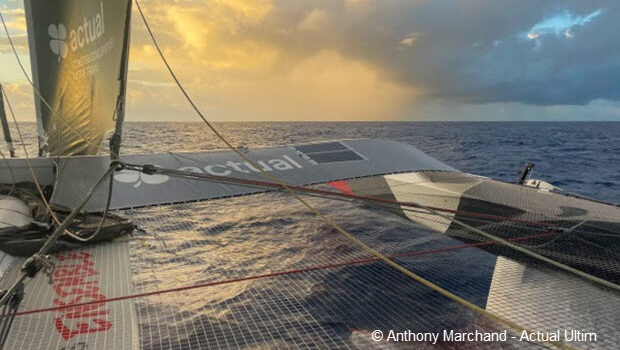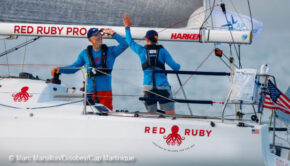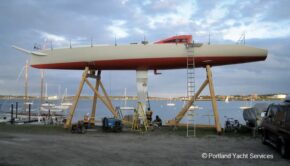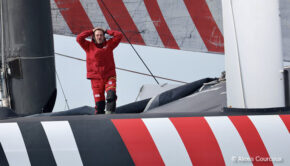Getting rest while solo sailing
Published on January 22nd, 2024
For the six Ultim Class multihulls racing in the solo non-stop ARKEA ULTIM CHALLENGE-Brest, getting rest while their boat sets a blistering yet blind pace around the world would not seem too restful. And while a good night’s sleep is not an option, neither is getting no sleep.
“To last the distance, long term you have to eat well and sleep well,” notes skipper Charles Caudrelier. But sleeping well is a battle and requires preparation both technically and psychologically. That can be specific equipment, alarms, working with freedivers. Sleep management has long since become a performance issue.
“What we try to do is to sleep as regularly as possible five, six, maybe seven times cumulatively over any 24 hours in increments of 30 to minutes to 1 hour 30,” explains skipper Armel Le Cléac’h. “As soon as the conditions are good, you have to sleep.”
Sébastien Josse, a member of the Banque Populaire routing unit and co-skipper of Le Cléac’h on the Transat Jacques Vabre, notes how 6 to 8 hours of sleep is possible.
“At the start, you are in great shape for maybe 48 hours but inevitably, as you expend your energy, you go into sleep deficit,” explains Josse. “Then you take your little nap, you wake up to check everything and if it’s possible, you can go back to sleep.”
Among the gains from being well-rested is the psychological aspect. To get into deep, restful sleep, it is important to reach a stat of release, of relaxation, to let go, to be as relaxed as possible. To achieve this, skipper Thomas Coville worked with a freediver, Alice Modolo. And so did Charles Caudrelier who worked with Arnaud Jerald, holder of the freediving record (122 meters).
“Charles wanted to disconnect when he can from the boat, from the numbers and the stress, from all the information that he must be on top of,” explained Jerald. “He wanted to have a choice. However, in freediving, it is only feeling. We start by working on breathing to lower the heart rate and begin to let go.”
Above all, the experience of apnea (suspending breathing) helps you move on mentally. At the end of the joint work with Jerald, Caudrelier wanted to reach 30 meters: he had to work hard, even slowing down to 25 meters before getting to the limit. “It’s a way of pushing one’s limits, of passing a milestone like a tipping point,” notes Jerald. “By achieving this, he gains experience, opens another avenue.”
The test of sleep skills is when the body is stressed and over tired, perhaps after several days of carrying out maneuvers or facing difficult weather conditions. It is not uncommon to have a fall, or get injured because of the lack of energy. Or, to oversleep.
“The problem is that sometimes you are so tired that you end up integrating it into your dream and end up waiting 5 to 10 minutes before responding to it,” admits Josse.
Skippers know that a race can be lost because of waking up too late. Alex Thomson’s misadventure on the Route du Rhum 2018 had him, with just a few miles from the finish, hit a cliff when he was not wakened by his electric pulse watch (whose battery had broken).
But the body has a great capacity to adapt and the management of sleep on board is proof of this. “Of course, sometimes you wake up and need a few seconds to remember where you are, on board, racing, with such and such a sail configurations and such and such a speed,” notes Josse. “But most of the time, you wake up just before the alarm. That’s what means you’re not too burned out when you wake up… And that’s the magic of the experience, of knowing yourself and your limits.”
Details: https://arkeaultimchallengebrest.com/en
The Ultim Class trimarans have a maximum length of 32 meters and a maximum width of 23 meters.
The solo speed record around the world was set in 2017 by François Gabart (FRA) on the 30m Macif trimaran in a time of 42d 14h 40m 15s for an average speed of 21.08 knots. This yacht has been rebranded and will be raced by Marchand.
Entrants:
• Charles Caudrelier (FRA), Maxi Edmond de Rothschild (2017 Verdier 32/23)
• Thomas Coville (FRA), Sodebo Ultim 3 (2019 VPLP/others 32/23)
• Tom Laperche (FRA), Trimaran SVR-Lazartigue (2021 VPLP 32/23)
• Armel Le Cléac’h (FRA), Maxi Banque Populaire XI (2021 VPLP 32/23)
• Anthony Marchand (FRA), Actual Ultim 3 (2015 VPLP 30/22)
• Éric Péron (FRA), Trimaran Adagio (2014 VPLP 31/21)*
* Only entrant without foiling appendages
Five rules from the Sailing Instructions:
• The start line is kept open for 168 hours and the finish line is closed after an elapsed time of 100 days after the start time, that is to say 16th April 2024.
• The skippers can communicate and exchange with their teams on shore, so they have the freedom to get weather information and be routed by their team on shore and get technical help and advice to help with technical problems.
• The solo skippers can stop but there are two distinct operations. A technical stop is unassisted and requires the sailor to drop anchor, take a mooring, or tie up alongside an anchored or moored boat with no external help. There is no time penalty for a technical stop. But for a technical stopover (escale technique) where one or more crew or technical team come on board to help, there is a mandatory 24 hours minimum. This does not apply to the start port of Brest where all means are authorized to reach or leave the port within a radius of 50 miles.
• For the first time in ocean racing, zones where there are known to be a high concentration of whales and sea mammals are determined. Establishing these zones should both protect the marine wildlife and reduce the chance of a collision. These zones are around the Azores, the Canaries, south of South Africa, the Kerguelens, and parts of the Antarctic.
• There are ice exclusion zones to protect the skippers and their boats.
Source: OC SPort Pen Duick









 We’ll keep your information safe.
We’ll keep your information safe.